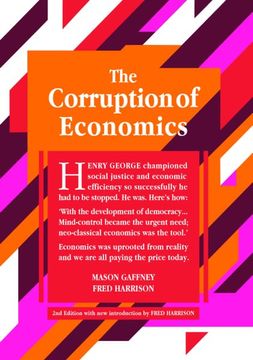Compartir
The Corruption of Economics: 2nd Edition (en Inglés)
Fred Harrison
(Autor)
·
Mason Gaffney
(Autor)
·
Shepheard-Walwyn Publishers
· Tapa Blanda
The Corruption of Economics: 2nd Edition (en Inglés) - Gaffney, Mason ; Harrison, Fred
$ 103.563
$ 207.126
Ahorras: $ 103.563
Elige la lista en la que quieres agregar tu producto o crea una nueva lista
✓ Producto agregado correctamente a la lista de deseos.
Ir a Mis Listas
Origen: Reino Unido
(Costos de importación incluídos en el precio)
Se enviará desde nuestra bodega entre el
Martes 18 de Junio y el
Martes 25 de Junio.
Lo recibirás en cualquier lugar de Colombia entre 1 y 5 días hábiles luego del envío.
Reseña del libro "The Corruption of Economics: 2nd Edition (en Inglés)"
Revealing the mystery of persistent economic failure, this book explains how the distorted view of economics has protected vested interests and prevented a more efficient economy, more equitable distribution of wealth and greater protection for the environment. This book is for those who know there is something wrong with our current system and want to discover more about what this is and what can be done to put it right. Some years ago, The Economist carried a lead editorial, ' The puzzling failure of economics' . The frank admission was provoked by the publication of a new edition of Paul Samuelson's Economist. The editorial concluded that it ' is not a failure of economics, in fact, but of modern [neo-classical] economics' . In the second edition of The Corruption of Economics, the authors argue there is nothing puzzling about this failure. They document how the integrity of economics as a discipline was deliberately compromised towards the end of the 19th century. The tool for this strategy became new-classical economics. Classical economists like Adam Smith had described wealth as the product of three factors - land, labour and capital, whereas the new theorists reduced these to two, labour and capital, treating land as capital. The effect, the authors reveal, was to deprive professional economists of the ability to diagnose problems, forecast important trends and prescribe solutions. Neo-classical economics condemns the post-industrial economy to protracted periods of economic failure.
- 0% (0)
- 0% (0)
- 0% (0)
- 0% (0)
- 0% (0)
Todos los libros de nuestro catálogo son Originales.
El libro está escrito en Inglés.
La encuadernación de esta edición es Tapa Blanda.
✓ Producto agregado correctamente al carro, Ir a Pagar.

